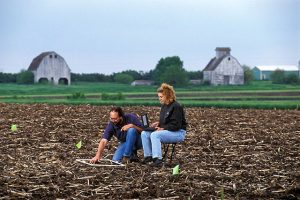Chapter 2: Why Are Weeds So Successful? Basic Ecology Concepts
2.2 Importance of Scientific Approaches
When thinking about best practices of weed management, it is important to consider the entire ecosystem. An ecosystem is the compilation of organisms living together – all of the plants, animals, insects, diseases, etc. working together. It is easy to overlook this larger picture concept and focus on the immediate growing season and crop of corn or soybeans. However, a broader view will help you anticipate what the next challenge will be and prepare to address it early on. One way to anticipate future problems is to think about what we are doing as farmers, and how that is changing the field level ecosystem. Are some production practices imposing different environmental conditions, which may give a niche for a new weed to become a problem? Another helpful way to widen your awareness and prepare for future problems is to stay up to date with the latest peer-reviewed research, extension, and USDA findings.

Weed science researchers follow an approach called the scientific method, in which they design an experiment to test a hypothesis. The hypothesis gives a possible explanation to why something is happening and is generated based on what they’re seeing in the field, greenhouse or lab. It can also be tested for further validation. One example might be that farmers and extension educators are noticing a higher prevalence of purple dead nettle. Researchers will come up with ideas and reasoning behind the biological cause and then setup some kind experiment to test the hypothesis. Is it a fluke or is there indeed something causing this weed to thrive more than before? Researchers will test the hypothesis on smaller plots and then utilize their findings on a grander scheme to help producers make management decisions.
Researchers and extension educators will submit their work to what is called a peer review process. During this process 3 other researchers will review the hypothesis, the experimental design, data analysis and the conclusions for accuracy. In this manner, peer-reviewed materials meet the highest standard of credibility and soundness of new scientific understanding. Farmers can collaborate with weed science researchers and extension professionals in conducting on farm research trials to not only better understand the dynamics on their own farm, but to also help researchers make recommendations to farmers across the region. The Weed Science Society of America is a good place to find this type of peer reviewed information. http://wssa.net/
Review and Reflection